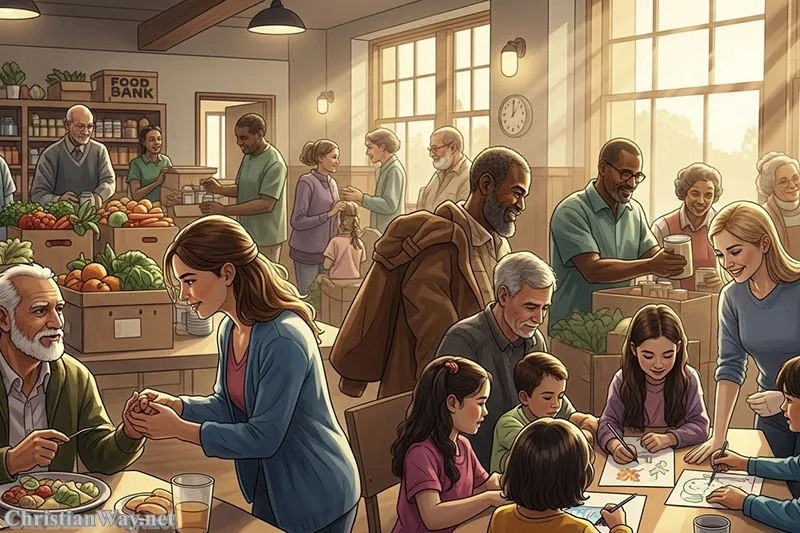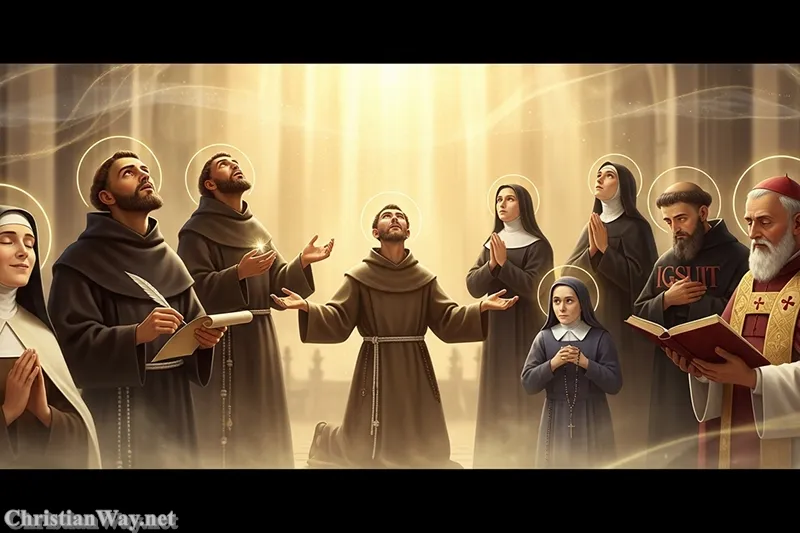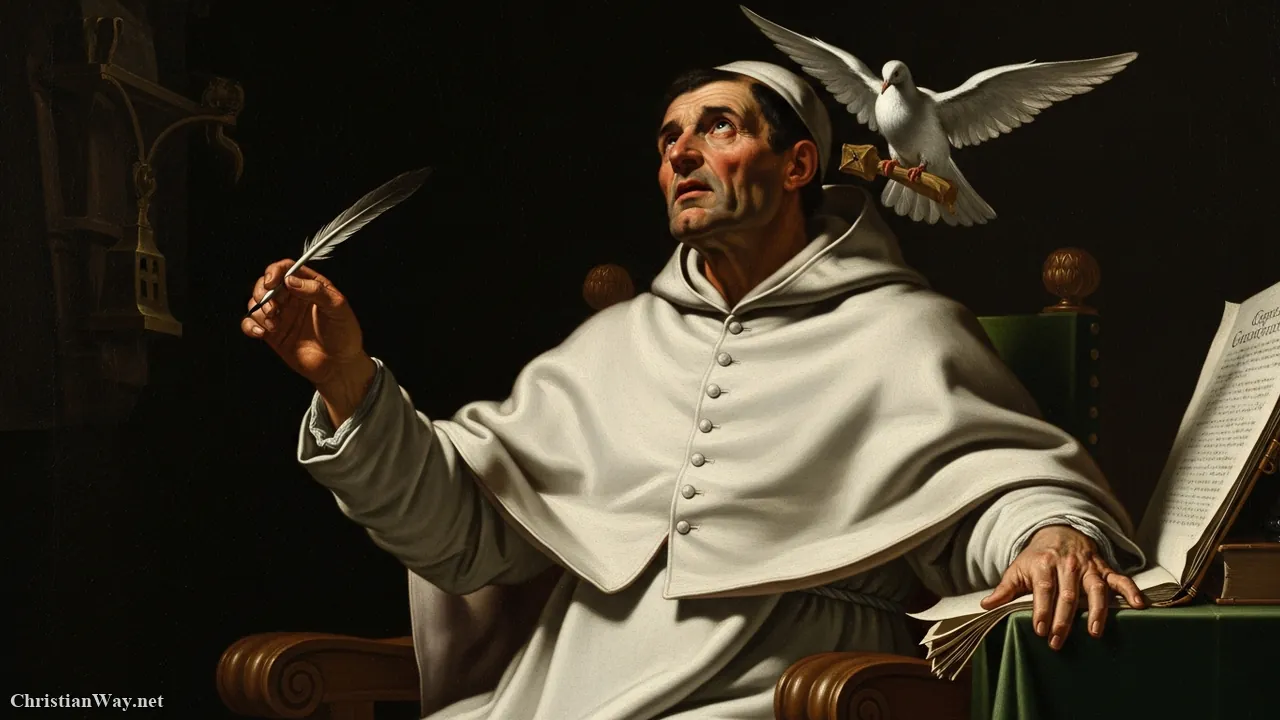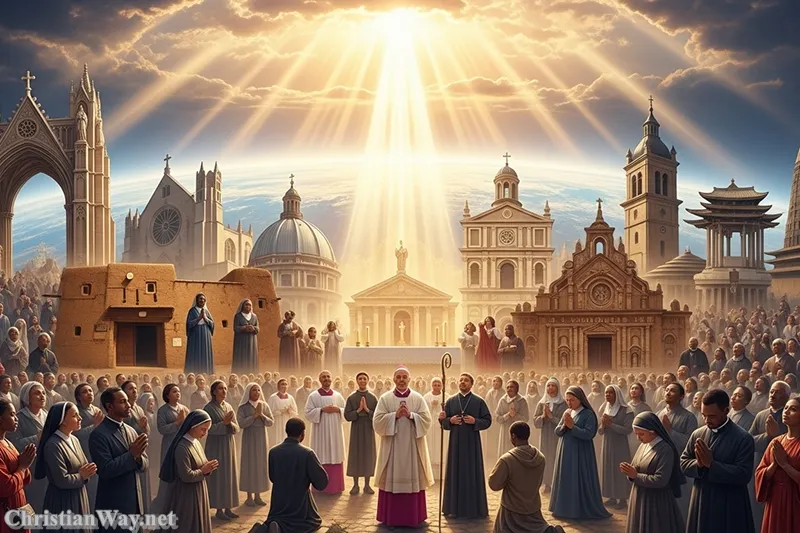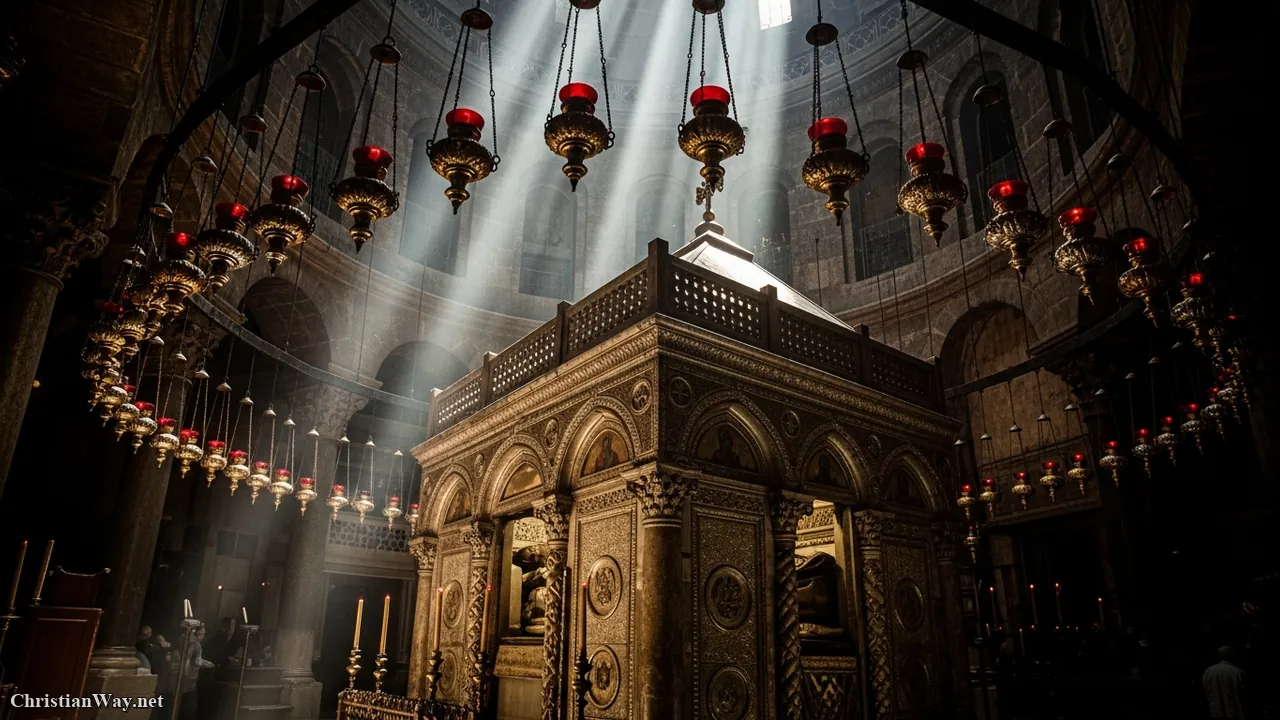Dear friends in Christ,
Every human soul carries within it a deep yearning — a quiet but insistent desire to be loved, forgiven, and made whole. From the moment we draw breath, something in us reaches beyond this world, searching for the One who alone can satisfy the heart. The story of salvation is the story of that search — and even more deeply, it is the story of God searching for us.
The Catholic understanding of salvation and grace is not simply about escaping sin or earning heaven. It is about a relationship — the living, transforming communion between God and the human soul. It is the mystery of divine love poured out upon humanity, a love that saves not only through mercy, but through a total renewal of the heart. In Christ, salvation is not merely a legal pardon, but a re-creation of our very being.
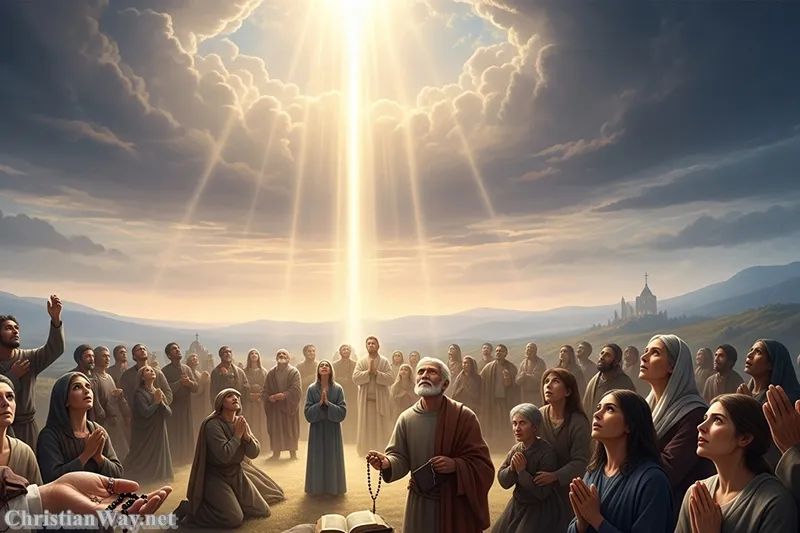
Let us walk gently through this mystery — to see what the Church teaches, what Scripture reveals, and how grace touches the soul in the real moments of life.
The Heart of Salvation: God’s Desire for Humanity
At the center of Catholic belief lies a profound truth: salvation begins with God, not with us. Before we could ever reach for Him, He reached for us. The Catechism of the Catholic Church expresses it beautifully:
“The initiative belongs to God in the order of grace, no one can merit the initial grace of forgiveness and justification.” (CCC 2010)
God’s saving will is universal. As St. Paul writes, “God desires all men to be saved and to come to the knowledge of the truth.” (1 Timothy 2:4) This means that salvation is not an exclusive privilege but a divine invitation extended to every human person.
From the dawn of creation, God intended humanity to share in His divine life. Yet through sin, that harmony was broken. The story of salvation, therefore, is not God changing His mind about us, but God fulfilling His eternal purpose despite our sin. The entire economy of grace — from the covenant with Abraham, through the prophets, to the Incarnation of Christ — reveals a God who refuses to abandon His children.
Salvation in Christ Alone
The Cross and Resurrection
The Catholic Church proclaims with unshakable faith that salvation comes only through Jesus Christ, the Son of God, who by His death and resurrection reconciled humanity to the Father.
“For there is one God, and there is one mediator between God and men, the man Christ Jesus.” (1 Timothy 2:5)
Through His Passion and Cross, Christ bore the weight of sin, not as a victim of injustice, but as the Redeemer who transforms suffering into love. The Resurrection is not merely proof of victory over death; it is the dawn of a new creation.
The Church teaches that salvation is not an external transaction — it is participation in the very life of Christ. Through baptism, we are joined to His death and resurrection, dying to sin and rising to new life. As St. Paul says, “If anyone is in Christ, he is a new creation.” (2 Corinthians 5:17)
The Church as the Sacrament of Salvation
Catholic theology also teaches that the Church is not simply an organization but the sacrament of salvation — the visible sign and instrument through which the grace of Christ flows into the world. Through her sacraments, teachings, and life of prayer, the Church continues the saving mission of Christ until the end of time.
To be Catholic is not to claim a monopoly on God’s mercy, but to recognize where His fullness dwells — in the Body of Christ, which He established as a home for all who seek Him.
The Mystery of Grace
What Is Grace?
Grace is perhaps the most beautiful word in Christian language. It is God’s free, undeserved gift of His own divine life, poured into our hearts through the Holy Spirit. Grace is not something we earn; it is something we receive.
“For by grace you have been saved through faith; and this is not your own doing, it is the gift of God.” (Ephesians 2:8)
In Catholic theology, grace is both a gift and a power — it forgives, heals, sanctifies, and strengthens. The Church distinguishes between two primary kinds of grace:
- Sanctifying Grace — the habitual gift that makes us sharers in God’s own life. It is received first at Baptism and restored through the Sacrament of Reconciliation.
- Actual Grace — the divine assistance God gives us in particular moments, guiding us toward good, inspiring repentance, or strengthening us to love more deeply.
Grace, then, is not only about being “saved” once; it is about being continually transformed by the love of God at every stage of life.
The Cooperation of Human Freedom
While grace is entirely God’s initiative, the Catholic Church teaches that man must freely cooperate with it. God’s love never forces; it invites. This is the mystery of free will: God, in His humility, allows us to say “yes” or “no” to His grace.
The Council of Trent (1547) explained this dynamic beautifully — that grace prepares the human heart for conversion, but we must consent to it. Our response is faith working through love (Galatians 5:6). Thus, salvation involves both divine initiative and human cooperation.
This cooperation is not “earning” salvation; it is participating in it. A branch does not create life, but it must remain attached to the vine to bear fruit (John 15:5).
Faith, Works, and the Life of Grace
Faith as the Door
Faith is the doorway through which grace enters. The Catholic Church agrees with St. Paul that salvation is by grace through faith (Ephesians 2:8). Yet the Church also insists that true faith is living, not merely intellectual assent.
As St. James writes, “Faith without works is dead.” (James 2:26) This does not mean we “earn” heaven, but that genuine faith inevitably expresses itself in love.
The Role of Good Works
In Catholic teaching, good works are not the price of salvation but the fruit of grace. When grace truly dwells in a person, it produces charity, mercy, and service. The works of mercy — feeding the hungry, comforting the sorrowful, forgiving others — are not extra duties; they are the natural outpouring of divine love within us.
Jesus Himself taught this in the parable of the final judgment: “Whatever you did for one of the least of these, you did for Me.” (Matthew 25:40)
Our works are not about merit alone but about communion. In every act of love, grace becomes visible.
The Sacramental Path of Salvation
The Catholic life of grace unfolds through the seven sacraments, each one a visible sign of the invisible reality of God’s mercy.
Baptism: The Beginning
In Baptism, we are cleansed from original sin and reborn as children of God. It is the foundational sacrament of salvation — the door through which we enter the life of grace.
“Unless one is born of water and the Spirit, he cannot enter the kingdom of God.” (John 3:5)
Eucharist: The Food of the Soul
The Eucharist sustains the life of grace. In receiving the Body and Blood of Christ, we are united to Him and to one another in the most intimate communion possible on earth.
Reconciliation: The Renewal of Grace
Even after baptism, we fall. But God’s mercy never ceases. Through the Sacrament of Reconciliation, grace restores what sin has wounded. This sacrament is not a burden but a gift — an encounter with the healing love of Christ, who says, “Your sins are forgiven. Go in peace.”
Confirmation, Marriage, Holy Orders, and Anointing of the Sick
Each of these sacraments strengthens us in specific states of life, offering the grace needed for mission, love, and endurance. The sacramental life, then, is not ritual for ritual’s sake; it is the rhythm of divine grace in the journey of salvation.
The Ongoing Journey: Salvation as a Process
In Catholic theology, salvation is both a moment and a journey. It begins at baptism, continues throughout life as we grow in holiness, and finds its fulfillment in eternal union with God.
This means salvation is not a one-time event, but a lifelong pilgrimage of faith and conversion. We are “being saved” (1 Corinthians 1:18), drawn ever deeper into the mystery of divine love.
The saints understood this well. St. Augustine wrote, “God who created you without you will not save you without you.” Salvation is a relationship that unfolds over time — a divine dance between grace and freedom, mercy and response, love and surrender.
Grace in Daily Life
Salvation is not something distant or abstract. It touches the ordinary — the moments of patience, the small acts of forgiveness, the quiet prayers whispered in the dark. Every time we choose love over anger, truth over deceit, mercy over pride, grace is at work within us.
To live in grace is to see the world as sacramental — to find God hidden in every face, every trial, every joy. It means knowing that even in our failures, grace remains stronger than sin.
The Catholic view of salvation, then, is profoundly hopeful: we are never beyond the reach of grace. God’s mercy is always ahead of us, drawing us closer, transforming even our wounds into channels of love.
The Communion of Saints and the Hope of Heaven
Salvation in the Catholic sense is not solitary. We are saved in communion — as part of the mystical Body of Christ. The saints in heaven, the souls being purified, and the faithful on earth are united in one living bond of grace called the Communion of Saints.
This communion reminds us that grace is not limited by death. Those who have gone before us intercede for us, and we, in turn, pray for the souls who still await the fullness of light.
Heaven is the completion of salvation — the soul’s perfect union with God. It is not a distant realm but the final flowering of grace begun here on earth.
Reflect and Pray
Dear friends, salvation and grace are not theological concepts to be debated but gifts to be received. They tell us that we are loved beyond measure — not because of what we do, but because of who God is.
If you have ever felt unworthy of God’s love, remember this: salvation is not a reward for the righteous but mercy for the broken. Grace is not given to the perfect but to those willing to be healed.
Let us pray:
Lord Jesus Christ,
You are our salvation and our peace.
Pour Your grace into our hearts anew — that we may live as children of the Father,
walk in the light of Your truth,
and never lose hope in Your mercy.
Strengthen our faith, deepen our love,
and let Your grace make us new each day.
Amen.
May the peace of Christ dwell richly in your heart, and may His grace carry you gently toward the fullness of salvation.
— Fr. John Matthew, for Christian Way
